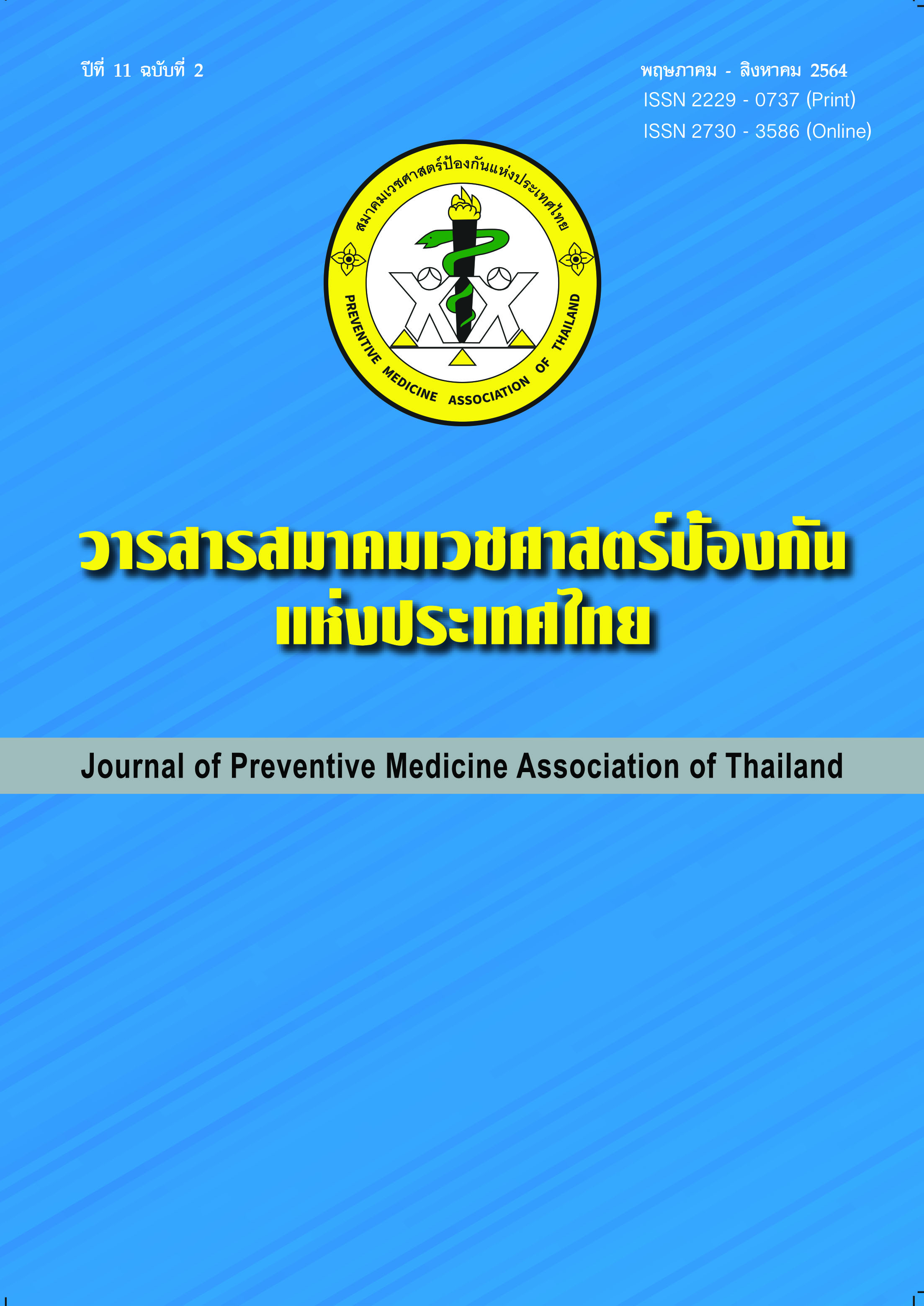Case study of return to work management in a patient with dysthymia
Keywords:
Return to work management, Dysthymia, Risk, Capacity, ToleranceAbstract
At present, mental health problems in working-age people tend to increase steadily. It is considered major public health problems worldwide including Thailand. Therefore, providing effective cares for working-age people with mental health problems or psychiatric disorders is inevitably essential. As a result, this study aims to raise awareness of the importance of caring for patients with psychiatric disorders to be able to return to work properly and safely. The study was conducted with a 47-year-old Scottish male patient who was a technical supervisor at an offshore drilling company. The patient suffered from dysthymia and went to a hospital in Songkhla Province for treatment. The illness affected the work of the patient due to he had to take days off for a period of up to 11 months. So it was necessary to receive a return to work assessment. The procedures of this assessment conducted with the patient were collecting information by checking background of the illness, job characteristics, physical examination, mental status examination and the history of medical records obtained from the medical record to be to assessed according to the principles of return to work management, which consisted of assessments of risk, capacity, and tolerance according to the proposal specified by the American Medical Association. This patient received the medical care and had the opportunity to return to work safely and efficiently. The evaluation and care of patients before returning to work were one of important health services which is necessary to obtain cooperation from many parties from both the medical department conducting treatment, Occupational medicine doctors, employers, human resources department of establishments, patient's relatives and the patient himself.
References
ศูนย์พัฒนาวิชาการอาชีวอนามัยและสิ่งแวดล้อม จังหวัดสมุทรปราการ. แนวทางการบริหารจัดการประเมินและดูแลผู้ป่วยก่อนกลับเข้าทำงาน (return to work management). กรุงเทพฯ: กรมอนามัย กระทรวงสาธารณสุข; 2560.
วิวัฒน์ เอกบูรณวัฒน์. การดูแลผู้ป่วยกลับเข้าทำงาน. พิมพ์ครั้งที่ 2. ชลบุรี: มูลนิธิสัมมาอาชีวะ; 2559.
กฎกระทรวง กำหนดมาตรฐานการตรวจสุขภาพลูกจ้างซึ่งทำงานเกี่ยวกับปัจจัยเสี่ยง พ.ศ. 2563, ราชกิจจานุเบกษาเล่มที่ 137, ตอนที่ 80 ก. (ลงวันที่ 5 ตุลาคม 2563).
Talmage JB, Melhorn JM, Hyman MH. AMA Guides to the evaluation of work ability and return to work. 2nd ed. Chicago: AMA; 2011.
World Health Organization. Depression and other common mental disorders: global health estimate. Geneva: WHO; 2017.
กรมสุขภาพจิต. รายงานผู้ป่วยมารับบริการด้านจิตเวช: ข้อมูลจากคลังข้อมูลการแพทย์และสุขภาพ กระทรวงสาธารณสุข (HDC) ประจำปีงบประมาณ 2562 [อินเทอร์เน็ต]. นนทบุรี: กรมสุขภาพจิต; 2562 [เข้าถึงเมื่อ 5 ธ.ค.2563]. เข้าถึงได้จาก:https://dmh.go.th/report/datacenter/hdc/reds.asp
American Psychiatric Association. Diagnostic and statistical manual of mental disorders. 5th edition. Arlington: APA; 2013.
จตุรพร แสงกูล. เอกสารคำสอนเรื่อง Approach to depressive and manic patients [อินเทอร์เน็ต]. สงขลา: ภาควิชาจิตเวชศาสตร์ คณะแพทยศาสตร์ มหาวิทยาลัยสงขลานครินทร์; 2561 [เข้าถึงเมื่อ 5 ธ.ค.2563]. เข้าถึงได้จาก:http://medinfo2.psu.ac.th/psychiatry/elearning/document/undergrade/Document%20year%204/depressive%20.pdf
Lagerveld S, Houtman I. Return to work after sick leave due to mental health problems. Netherlands: The Netherlands Organisation for applied scientific research; 2020.
PTT Exploration and Production Public Company Limited. Medical assessment of fitness to work for domestic offshore workers procedure. Bangkok: PTTEP; 2015.
ชนกานต์ ชัชวาลา. การใช้ยาทางจิตเวชในเวชปฏิบัติจิตเวชกรรม [อินเทอร์เน็ต]. สงขลา: ภาควิชาจิตเวชศาสตร์ คณะแพทยศาสตร์ มหาวิทยาลัยสงขลานครินทร์; 2560. [เข้าถึงเมื่อ 7 ธ.ค.2563]. เข้าถึงได้จาก:https://meded.psu.ac.th/binla/class06/388_622/Use_of_psychiatric_drugs/index.html
Downloads
Published
How to Cite
Issue
Section
License
บทความที่ลงพิมพ์ในวารสารเวชศาสตร์ป้องกันแห่งประเทศไทย ถือเป็นผลงานวิชาการ งานวิจัย วิเคราะห์ วิจารณ์ เป็นความเห็นส่วนตัวของผู้นิพนธ์ กองบรรณาธิการไม่จำเป็นต้องเห็นด้วยเสมอไปและผู้นิพนธ์จะต้องรับผิดชอบต่อบทความของตนเอง






